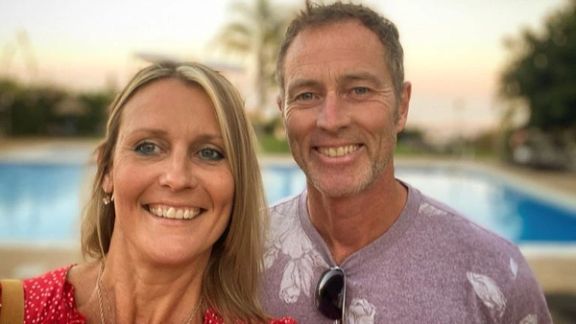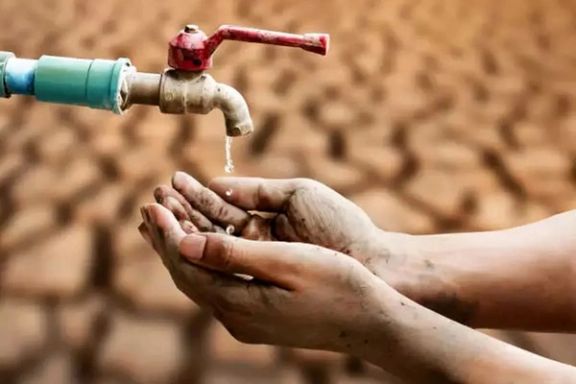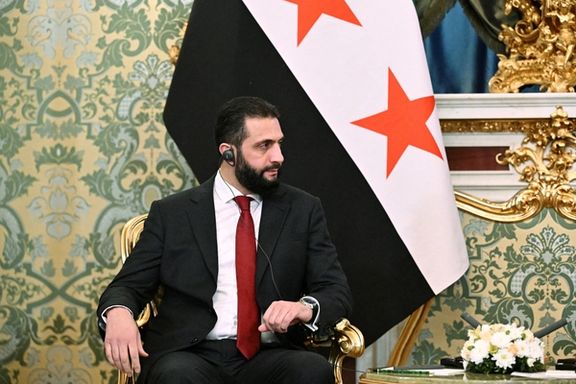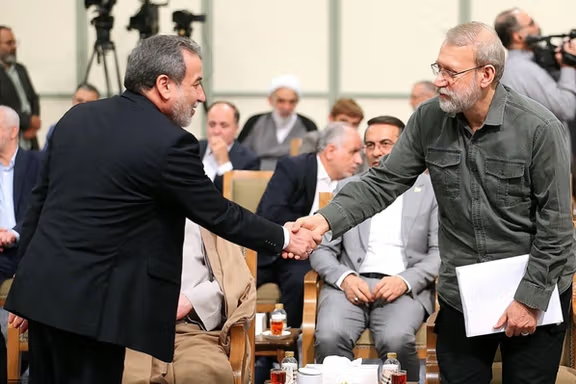Son urges UK to act as detained parents face a year in Iran

The son of a British couple jailed in Iran on spying charges has called on the UK government to secure their release before Christmas, the BBC reported on Tuesday.

The son of a British couple jailed in Iran on spying charges has called on the UK government to secure their release before Christmas, the BBC reported on Tuesday.

A water shortage in Iran is becoming more widespread with people reporting pressure drops and low-quality water even as Tehran officials deny reports of rationing.
Viewers submitted text, voice and video messages to Iran International documenting the adversity they face in getting a consistent supply of water.
Messages from Tehran, Karaj and Hamadan to Ahvaz and cities in Sistan and Baluchestan paint a picture of worsening water access and sharp criticism for what many view as poor management.
The responses indicate that in many Iranian cities, people are facing nightly outages and notable reduction in water pressure.
Inflow to Tehran’s reservoirs has dropped by 43 percent compared with the previous water year, Behzad Parsa, managing director of the Tehran Regional Water Company, told state media this week.
Parsa described the situation as unprecedented in decades, attributing it to a 100% decrease in rainfall in Tehran province compared with long-term averages.
Pressure Drops
"If the pump doesn't work, not a drop of water comes. The pressure in upper floors is very low, and everyone has the same problem," a resident in Tehran said.
"Since last night, water has been cut off, and no media - neither domestic nor foreign - has reported it," another message said.
Energy Minister Abbas Aliabadi on Sunday called the nightly pressure cuts a temporary management tool to stabilize the city’s aging water network and reduce leakage. Similar steps taken during the summer, he said, conserved significant volumes.
"Sometimes we have no water for two full days. Summers it was electricity. Now it's water's turn," one resident of Pardis in Tehran said.
Other messages from different cities in Tehran and Karaj shared reports with the same theme: "Low pressure and frequent outages; nightly shortages repeat."
A video shows a group of students from Al-Zahra University in Tehran protesting water outages on Sunday, saying water has been rationed due to frequent cuts.
President Masoud Pezeshkian warned last week that if rainfall does not resume by the end of autumn, Tehran will face water rationing, adding, “If it still doesn’t rain, we will have no water and will have to evacuate the city.”
North, Northwest and West
Some messages from different parts of Iran echo the same issues with lower pressure and continuous shortages.
"In Rasht, the city of rain, sometimes water is cut off from sunset or pressure drops severely. Since most homes have pumps, many don't notice," one message said.
"With people's efforts and no government help, we secured drinking water. No support from the government."
"No shortages yet, but they say reservoirs are 40% down. Probably soon they'll cut water like in Tehran," a messages from Saqqez mentioned.
"The water situation in Asadabad is very bad," one message from Western Iran read. "For years, we've been bringing water from the mountains because the city's water quality is terrible."
South, Southeast and Northeast
In Khuzestan, complaints are not just about water shortages in some areas but also very poor quality in others.
"Water is there but either smells of chlorine or is muddy. When it's cleaner, it smells like rotten eggs. Pressure was very low for a few days too," a message read from Ahvaz.
"Bottled water for drinking, 20-liter jugs for cooking, tankers for usage. Curse this regime, the clerics, and the Islamic Republic," one message said.
In Sistan and Baluchistan Province, conditions are reported as more critical than elsewhere, where drinking water is supplied by jerry cans and tankers as in past years.
"No rain, and the Golestan Dam has no water. Farmers in our area no longer have the energy to plant wheat and barley; the situation is disastrous," a message from the city of Gonbad-e Kavus in Golestan Province said.
"Water is so scarce that the water heater doesn't boil. We wash dishes with lukewarm water, and for showers at night, we fill buckets from the heater. It's disastrous," one message from Mashhad said.
Some messages spoke of increased water bill amounts, lack of official accountability, and complete distrust of the government.
"They've made bills three to four times more expensive," one message said. "For three years, they've been stringing people along; now in polluted air, we're dying, and we have no water."

Syrian President Ahmed al-Sharaa told the Washington Post his government has expelled Iranian and Hezbollah forces from Syria and is ready for a new phase of ties with the United States.
“The most important objective is starting on building the relationship between Syria and the United States, because in the past 100 years, it wasn’t a very good relationship,” he said in an interview published on Tuesday.
Al-Sharaa said his country is in talks with Israel with support from President Donald Trump and other international partners.
“Israel has always said it has concerns about Syria because it is afraid of the threats that the Iranian militias and Hezbollah represent,” he said. “We are the ones who expelled those forces out of Syria.”
He said Syria’s negotiations with Israel have made progress. “We are engaged in direct negotiations with Israel, and we have gone a good distance on the way to reach an agreement,” al-Sharaa said. “But to reach a final agreement, Israel should withdraw to their pre-Dec. 8 borders.”
“The United States is with us in these negotiations,” he said. “Today, we found that Mr. Trump supports our perspective as well, and he will push as quickly as possible in order to reach a solution for this.”
On the idea of creating a demilitarized zone south of Damascus, al-Sharaa said, “To talk about an entire region demilitarized, it will be difficult, because if there is any kind of chaos, who will protect it? And at the end of the day, this is Syrian territory, and Syria should have the freedom of dealing with their own territory.”
Al-Sharaa seeks pragmatic ties with Russia
Turning to Russia, al-Sharaa said Syria fought Moscow’s forces for a decade but now seeks a working relationship with it as a permanent member of the UN Security Council. “We need Russia because it’s a permanent member of the Security Council,” he said. “We need their vote to be on our side in some issues, and we have strategic interests with them.”
He added that the issue of former president Bashar al-Assad, who is in Russia, remains unresolved. “The issue of Bashar al-Assad is troublesome for Russia, and our relationship with them — we’re still in the beginning,” he said. “We will preserve our rights as Syrians to call for bringing Assad to justice.”
His remarks came as the United States suspended most sanctions on Syria for 180 days while keeping curbs on business tied to Iran and Russia, the Treasury said on Monday. The decision extends partial relief under the Caesar Act but maintains restrictions on transactions involving the two governments or their goods, technology or financing.
The step followed al-Sharaa’s visit to Washington, the first by a Syrian head of state, where he met Trump for talks on rebuilding ties. Washington removed al-Sharaa from its list of Specially Designated Global Terrorists before the visit, according to US officials.

Iran’s nuclear negotiations have long served to buy time for building atomic weapons, prominent Tehran-based political commentator Sadegh Zibakalam said in a debate published on Tuesday.
Zibakalam said the Islamic Republic had hidden behind anti-US and anti-Israel slogans while deceiving the world about its nuclear goals. “You have shouted death to America all your life and done all you could to destroy Israel. Your talks were fake. You were wasting time. You are after a nuclear weapon,” he said in the program released by the ON news media.
“If you take away their hostility toward America, they have nothing to tell the people,” he said.
Tehran repeats call for peaceful deal
His comments came a day after a senior Iranian diplomat said Tehran still wanted a “peaceful” nuclear agreement with the United States but would not compromise its national security. The deputy foreign minister accused Washington of sending “contradictory messages” through mediators and betraying diplomacy.
The two countries held five rounds of talks before a 12-day war in June between Iran and Israel, during which US forces struck Iranian nuclear sites. President Donald Trump said in October that Washington’s “hand of friendship” remained open if Tehran was ready to make a deal.
Zibakalam, who has faced several court cases and jail terms for his outspoken remarks, was charged in January after a speech in Doha angered authorities. Judiciary media said he was sentenced to prison for “propaganda against the system” and “spreading false information.”
Former senior official Mohammad Javad Larijani meanwhile said Iran can build a nuclear bomb in less than two weeks but has chosen not to. He said Tehran’s nuclear doctrine treats the capability as deterrence while forbidding weaponization under the guidance of Supreme Leader Ali Khamenei.

Israel's Defense Ministry is seeking a record high $45 billion allocation in the 2026 budget, Israeli financial daily Calcalist reported on Tuesday, including a large sum to counter Iranian drones and missiles.
The ministry seeks 144 billion shekels ($44.7 billion) for 2026, of which roughly 7 billion shekels ($2.2 billion) targets Iran's missile and drone expansion, the report said.
"Our enemies' focus demands immediate emergency resupply," said Major General Amir Baram, Defense Ministry director general, while criticizing the Finance Ministry for blocking billions in arms, tank parts, drones and border walls, citing Iran's drills and rearmament.
Calcalist is Israel's leading financial newspaper under Yedioth Ahronoth Media Corp.
Israel launched a surprise military campaign against Iran in June, striking nuclear and military sites. Tehran responded with hundreds of drones and ballistic missiles.
Following Israel's strikes, the United States targeted major nuclear sites in Fordow, Natanz, and Esfahan on June 22. President Trump called the attack successful, resulting in the “obliteration” of Iran's nuclear facilities.
The 12-day war concluded with a US-brokered ceasefire on June 24, halting military attacks on both sides. Yet in the months since, officials in both Iran and Israel have openly hinted at the prospect of another confrontation.
‘Proxy threat’
Israeli Finance officials countered they support defense but warn of economic risks from excess, blaming IDF “waste in reserves,” the report said. Baram conceded reforms but prioritized Iran's vows of revenge alongside Hezbollah threats.
Baram noted current spending at 6.7% of GDP (vs. 35% in 1973) and called for swift replenishment, including a Jordan border fence.
Prime Minister Benjamin Netanyahu said on Monday that Tehran remains a threat to Israel but was weakened by the punishing 12-day war in June.
“We crushed Iran’s axis of evil. We distanced and neutralized the dual threat from Iran—the nuclear threat and the ballistic threat alike," Netanyahu told the Knesset amid growing criticism from opposition lawmakers.
“This is a real threat, but not what it once was. We act with determination, initiative, and strategy," he added.

Conflicting narratives from Iranian officialdom on negotiations with the United States may indicate a sort of organized chaos aimed at prolonging diplomatic theater without any real intention of reaching a resolution.
This pattern of contradictory statements suggests a deliberate strategy.
By constantly shifting positions and contradicting one another, Iranian officials may be attempting to prolong indirect messaging with Washington while avoiding actual negotiations, perhaps hoping to stall until Donald Trump leaves office.
On Monday, security chief Ali Larijani declared that Iran rejects Western demands to limit its nuclear program, while Foreign Minister Abbas Araghchi reiterated Tehran’s commitment to strengthening the so-called “axis of resistance.”
The United States and Europe have made halting uranium enrichment, ending support for regional proxy groups and curbing missile development key conditions for lifting sanctions and potentially normalizing relations with Iran.
Larijani also asked, “What right does the West have to talk about the range of Iran’s missiles?” and insisted that Tehran would not “surrender to the West even at the cost of full-fledged confrontation.”
His remarks likely reflect calculated defiance.
Larijani is well aware that Iran’s missile program is a major source of concern for Europe and neighboring countries, especially given Tehran’s military cooperation with Russia in the war against Ukraine and its provision of missiles to Houthi rebels in Yemen.
Yet he avoids questioning why Iran continues to involve itself in conflicts in Yemen, Lebanon and Gaza.
Following Iran’s missile response to Israeli strikes in June, and its operations targeting Iraqi Kurdistan and tribal areas in Pakistan in the past, Western powers and regional neighbors are under no illusion: Iran is willing to deploy missiles and drones whenever its clerical leadership or Revolutionary Guards commanders deem it necessary.
Despite ongoing public discourse by Iranian officials and media commentators about resolving the diplomatic impasse, Supreme Leader Ali Khamenei, and at times President Pezeshkian, Araghchi and Larijani have made it clear that Iran has no intention of negotiating directly with the United States.
Khamenei recently said that hostility toward the United States is intrinsic to the Islamic Republic’s identity. But on Monday, Larijani asserted that none of Iran’s leaders have ever had any enmity with the West.
Adding to the confusion, government spokesperson Fatemeh Mohajerani acknowledged that Iran has received messages from the United States, while the foreign ministry flatly denied any such contact.
'Cannot continue'
Meanwhile, media outlets continue to fuel the narrative of “talks about talks.”
On Monday, ILNA quoted foreign policy analyst Amir-Ali Abolfath as saying, “We are in the middle of a US attack on Iran.”
“Attacks don’t always come with guns and tanks," he added. "There are cyber wars, cognitive warfare, economic wars and sanctions. We are at war with the United States, only the sound of gunfire is missing.”
Abolfath concluded that the divide between Tehran and Washington is unbridgeable.
In contrast, commentator Ali Bigdeli, writing for Fararu, suggested that Iran should seek mediation from International Atomic Energy Agency chief Rafael Grossi to break the deadlock despite Grossi’s recent warning that Tehran could still eventually build a nuclear weapon.
While many Iranian commentators warned on Monday of imminent conflict with Israel or the United States, Bigdeli reassured Fararu readers that “another war is unlikely to break out.”
In a separate Fararu piece, analyst Ahmad Bakhshayesh Ardestani added, “another war is unlikely unless unrest erupts inside Iran.”
That paradox in official messaging may be untenable, Bigdeli warned: “The current situation cannot continue for long.”
Joe Bennett said his mother, Lindsay Foreman, and her husband, Craig, were arrested in January while traveling through Iran on a world tour. Both are being held in Tehran’s Evin prison and deny the charges.
“My family can’t carry on like this,” Bennett said. “This can’t be normalised. Silence is complicity.”
He said Mrs. Foreman is isolated and surrounded by people who do not speak English, while her husband is suffering from an untreated tooth abscess. “Every day is a waiting game, not knowing if she’s okay,” he said. “It’s a nightmare that never ends.”
The UK Foreign Office said it is providing consular support and continues to raise the case with Iranian officials.
The Foremans were tried in October, when relations between London and Tehran hit new lows after Britain and its European partners reimposed sanctions on Iran over nuclear concerns. Family members told the BBC they were not allowed to attend the hearing.
France reports release of detained nationals
In recent weeks, Bennett said he has watched France secure the release of its detained nationals and urged British leaders to act. “The French didn’t wait,” he said. “Their president spoke up and their citizens came home. Why hasn’t Britain done the same?”
Iran freed two French citizens, Cécile Kohler and Jacques Paris, earlier this month after more than three years in custody. President Emmanuel Macron said the pair had left Tehran’s Evin prison and were en route to the French Embassy, calling it “a first step” in ongoing dialogue between Paris and Tehran.
Earlier, Bennett told the Daily Telegraph the family was open to appealing for help from US President Donald Trump, who has recently signaled a willingness to re-engage diplomatically with Tehran. The family met Foreign Secretary Yvette Cooper last month to press for progress.
Rights groups have described the case as part of a wider pattern of “hostage diplomacy” by Tehran, which denies detaining foreigners for political leverage.